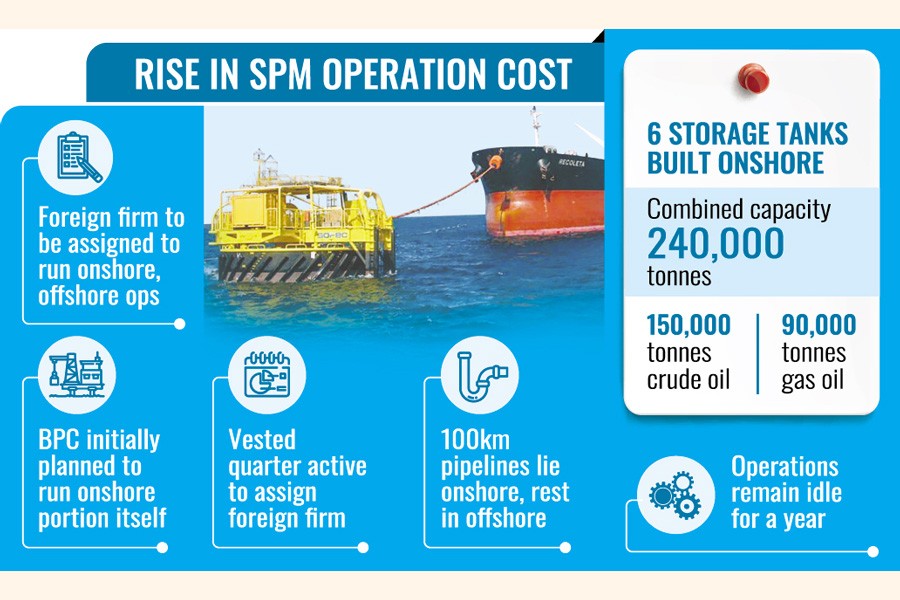
Published :
Updated :

The overall cost of operation of the country's maiden Tk 80 billion single-point mooring (SPM) to carry petroleum products from the sea to land is set to be much higher than the estimation as the authorities concerned have moved to assign a foreign contractor to look after both of its onshore and offshore operations, said sources.
The state-run Bangladesh Petroleum Corporation (BPC) initially planned to operate the onshore portion of the SPM itself to reduce operation costs, one of its senior officials told The Financial Express Sunday.
It intended to operate the onshore pipeline portion of the SPM by itself, utilising its experience of operating 126 kilometres of pipeline, which lie inside Bangladesh, of the total 131.50 kilometres of Bangladesh-India Friendship pipeline built for carrying diesel from India's Numaligarh refinery to Parbatipur in Dinajpur, he said.
The state-run oil company is also all set to initiate the operation of the 250km Dhaka-Chattogram pipeline next week, said the official.
The BPC recently formed a new company named Petroleum Transmission Company PLC (PTCP) to only operate oil pipelines at reasonable costs to keep oil prices in the local market reasonable, he further said.
But a vested quarter has been active to assign a foreign company to operate both the onshore and offshore portions of the 220km pipeline associated with the SPM.
Of the 220km pipeline, around 100 kilometres lie onshore and the remaining portion is offshore, a senior official of PTCP said.
The government can assign a foreign company only for the offshore portion of the pipeline as the BPC and its subsidiary companies do not have any experience to operate offshore pipeline, he said.
But the operatorship of the onshore portion of the pipeline should be kept with the BPC to reduce cost as it has relevant experience, he said.
Six storage tanks have also been constructed onshore.
The tanks have a combined capacity of 240,000 tonnes of petroleum products, with 150,000 tonnes designated for crude oil and 90,000 tonnes for gas oil.
The delay in selecting a contractor is delaying formal operations of the SPM, said sources.
The SPM has already been kept idle for around a year, and the BPC is counting extra money while using lighter vessels to carry fuel from mother vessels to tanks onshore as a consequence.
Officials said Chinese firm China Petroleum Pipeline Engineering Co Ltd (CPPEC) completed the construction of the SPM with a double-pipeline project and handed over the infrastructure to the BPC a year ago in August 2024.
The SPM system is used for piping petroleum from vessels far offshore into onshore storage tanks, thus slashing both time and cost of oil imports.
Sources said CPPEC built the country's maiden SPM system after being selected as a contractor unsolicitedly under the currently repealed Quick Enhancement of Electricity and Energy Supply (Special Provision) Act 2010.
The project cost escalated by 60 per cent to Tk 80 billion from the initial target of Tk 50 billion, they said.
The Chinese firm handed over the SPM project to the BPC in August last year.
The contract with the Chinese firm over building the SPM expired in June 2024.
The installation of the SPM with the double pipeline project was implemented with Chinese concessional loans of around $554 million.
Of the total loan, China provided around $467.84 million as preferential buyers' credit and the remaining $82.5 million as soft loan.
The Exim Bank of China provided the money, which is to be repaid within 20 years at an interest rate of 2.0 per cent per annum with a five-year grace period.
Once it is fully executed, the BPC will be able to unload petroleum products from a 100,000-deadweight tonnage tanker within 48 hours, which now takes 11 days.
No lighter vessels would be required to carry fuel from mother vessels, which are now moored at the outer quay, after the project's implementation.
The BPC, however, is still paying $5.50 per tonne to lighterage or small vessels, owned mainly by the Bangladesh Shipping Corporation (BSC), to ferry petroleum to its onshore tanks from larger mother vessels.
The SPM is set to save the cost of the BPC in unloading fuel significantly once it initiates commercial operations.
Once the SPM becomes fully operational, Bangladesh will annually save around Tk 8.0 billion ($75.50 million) solely by reducing the transport costs of petro products from outer anchorage to onshore fuel tankers.
The SPM will enable the offloading of 120,000 tonnes of crude oil within 48 hours and 70,000 tonnes of gas oil (diesel) within 28 hours.
Bangladesh annually imports around 7.0 million tonnes of combined crude and refined oils to meet the growing demand driven by a thriving economy.
Azizjst@yahoo.com


 For all latest news, follow The Financial Express Google News channel.
For all latest news, follow The Financial Express Google News channel.